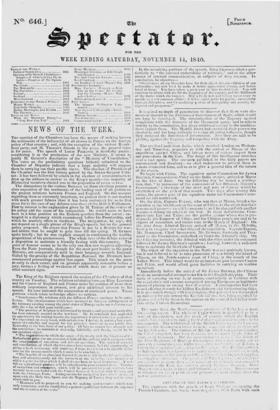NEWS OF THE WEEK.
THE opening of the Chambers has been the means of snaking known the sentiments of the influential of all classes in France on the foreign policy of that country ; and, with the exception of the violent Repub• lican party, and M. TRIERS'S friends in the press, the general voice is for peace. The speech of Louis PHILIPPE is decidedly pacific: considering it as the production of the new Ministry, it seems to justify M. GUIZOT'S description of the " Ministry of Conciliation." The votes on the preliminary questions hitherto submitted to the Chamber of Deputies indicate that a large majority will support them in carrying out their pacific views. The election of President of the Chamber was the first victory gained by the SOULT-GUIZOT Cabi- net: it has been followed by others in the election of commissioners to draw up the address in answer to the King's speech—the majority of Ministerial members elected was in the proportion of seven to two. The discussions in the various Bureaux on these elections present a clear exposition of the sentiments of the leading men of all parties on the present relations between France and England. On this account regarding them as extremely important, we present them to our readers with much greater fulness than it has been customary for us to find room for in the case of any debates save those of the British Parliament. First in interest is the explanation given by M. Tinuns of the course of his policy turd the cause of his resignation. He would seem to have been in a false position on the Eastern question from the outset ; en- tangled in a diplomacy which commenced before his Premiership, and which he scarcely offers to vindicate. The resignation, he says, did not depend on a single phrase of the King's speech, but on the general policy proposed. He avows that France is not in a fit state for war ; and admits that he sought to gain time till the spring. M. GUIZOIS spoke briefly ; hut he was explicit enough in condemning the warlike propositions of his predecessors. The whole tone of the debate evinced a disposition to maintain a friendly footing with this country. The point of honour seems to be the only one that now requires adjusting. Even the Parts journals, though for the most part hostile to the peace Ministry, are comparatively mild in their language towards England. Galled by the ttacks of the Republican National, the Ministers have commenced proceedings against that paper. This attack on the press so early in their career, and on grounds apparently untenable befine a Jury, betrays a feeling of weakness of which there are at present no other outward signs.


























